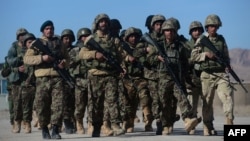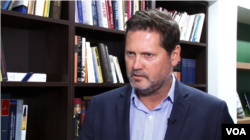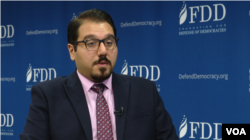The NATO alliance has agreed to send more troops to Iraq and Afghanistan to help security forces of those nations to stand up to militias backed by Iran.
At a two-day Brussels summit that ended Thursday, NATO leaders announced the launch of a noncombat training and capacity building mission in Iraq. It will build on a small Iraqi operation that began last year by training Iraqi defense and national security officials and Iraqi military instructors.
NATO leaders also said their 2-year-old training mission for Afghan security forces will get a boost with contributions of personnel from non-alliance members Qatar and the United Arab Emirates. The leaders praised those contributions and encouraged other interested countries to do the same.
The Wall Street Journal quoted NATO’s top official in Iraq, Paul Smith, as saying the new Iraqi training mission will include 500 troops, the first of whom will arrive in the coming months. Canadian Prime Minister Justin Trudeau said his government will contribute about half of the new forces.
Contributions uncertain
It is not clear how many Qatari and Emirati forces will join NATO’s Afghan training mission, Resolute Support. They will be the first ground troops from both nations to deploy in Afghanistan. The Gulf Arab forces will be part of an expanding NATO mission that will include an additional 440 noncombat British troops, a deployment also announced at the Brussels summit by British Prime Minister Theresa May.
The new NATO trainers will be working with Iraqi and Afghan security forces facing challenges from Iran-backed militias. For years, Shiite-majority Iran has provided its own training and other support to Shiite militias in Iraq and to Sunni Taliban rebels in Afghanistan, according to officials in both nations.
Iraqi Prime Minister Haider al-Abadi signed a decree in March to formally incorporate Tehran-backed Shiite militias known as Popular Mobilization Forces (PMF) into the Iraqi state security system. Iraq’s parliament had passed a bill in 2016 calling for the move, with the aim of making the PMF report directly to the prime minister.
Middle East analyst Michael Pregent of the Washington-based Hudson Institute told VOA Persian that NATO is making a mistake by seeking to train Iraqi forces that include ex-Shiite militiamen allied to Iran.
“Any NATO training mission actually will be providing funds, equipment and intelligence to Iranian proxies vetted by Iranian IRGC Quds Force commander Qassem Suleimani,” Pregent said. “If the mission is to train the Iraqi security forces to counter Iran, it will have the opposite effect.”
Iran and the Taliban
Afghan officials long have documented Iran’s training of Taliban militants fighting a 17-year war against U.S.-led forces and their Afghan government allies. A March report published by U.S. intelligence analysis company Stratfor said supporting the Taliban offers Tehran a way to counter the expansion of the Islamic State (IS) group in Afghan territory near Iran’s eastern border. IS militants, like the Taliban, are Sunnis. But unlike the Afghan rebel group, IS militants consider Shiite Iran an archenemy and carried out a deadly assault in Tehran in June 2017.
Also speaking to VOA Persian in Washington, Mideast analyst Behnam Ben Taleblu of the Foundation for Defense of Democracies welcomed NATO’s recruitment of Qatar and the UAE to the training mission for Afghan security forces. The Gulf Cooperation Council members have been at odds since last year, when the UAE joined Saudi Arabia and other Arab states in isolating Qatar economically and diplomatically. Riyadh and its allies were angered by Doha’s friendship with Iran and support for certain Islamist groups.
“If you get the GCC united on a counterterrorism mission to stabilize Afghanistan, that’s great,” Taleblu said. But he said Qatar’s years-long hosting of Taliban leaders could complicate that mission.
“It remains to be seen if the UAE and Qatar can in fact cooperate in an area like Afghanistan, and what will be the ultimate goal — to stabilize the central government, to fight IS, to reject Iranian influence? Qatar and the UAE are mostly divergent on these three things,” Taleblu said.
This report was produced in collaboration with VOA’s Persian Service.






